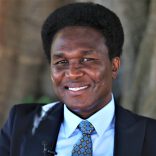Mozambique: President extends condolences on passing of former Zambian President Edgar Lungu
Macuácua says decentralisation model adopted could lead to conflicts – Mozambique

Photo: O País
Lawyer and member of parliament Edson Macuácua says that conflicts that will arise from the model of decentralisation adopted in Mozambique will turn the Constitutional Council into a de facto constitutional court.
Macuácua had been invited to give a lecture at the Technical University of Mozambique (UDM) on the theme “Constitutional revision of 2018: the new decentralisation and de-concentration paradigm”.
In the course of his lecture, Macuácua said he understood that the model of decentralisation adopted in the recent constitutional review could result in conflict, justifying his assertion with the high number of people who will govern the same territory.
There will be members of the district assembly, district governors, provincial governors, the president of the municipal council, the municipal council and the municipal assembly, he pointed out.
“If today, with only the municipality and the district government, there are situations of conflict, one may imagine the situations of conflict which may now occur, especially when citizens carrying out these different functions do not share the same party affiliation,” Macuácua said.
Quoted by O País, Macuácua went on to say that all the changes to the constitution that had been made were aimed at adapting aspects of decentralisation and, therefore, a new constitutional amendment would be necessary to define the type of state that is really intended.
“This is not a mechanical transposition of a model from another country. It’s an almost unparalleled model. What I envisage is that in the future we will return to the situation of the 1990 constitution, which rationalised local government,” he said. “Instead of having multiple bodies governing on the ground, we will have only two: one elected and another representing the state.”
Macuácua then explained the power the constitution gives to the president to dismiss a locally elected governor, arguing that this is a sanctioning power and that dismissal may only take place if there is no respect for collective interests and for the Mozambican constitution.
Macuácua’s lecture formed part of the opening of the second semester of UDM’s 2018 academic year.
By José João












Leave a Reply
Be the First to Comment!
You must be logged in to post a comment.
You must be logged in to post a comment.